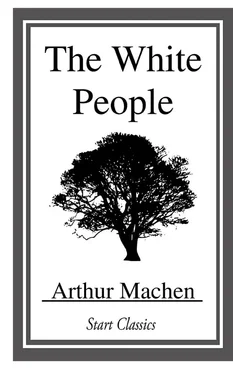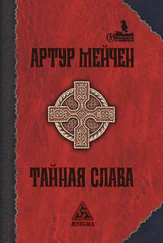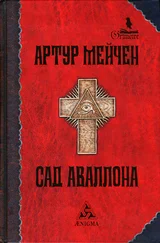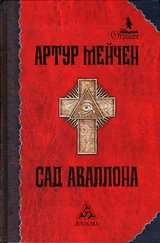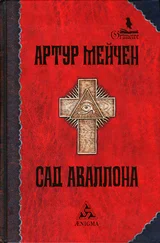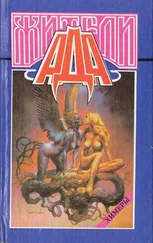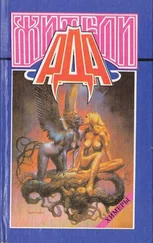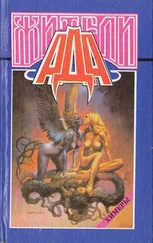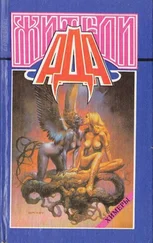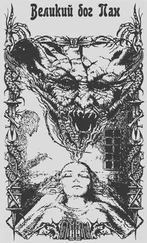Артур Мейчен - The White People
Здесь есть возможность читать онлайн «Артур Мейчен - The White People» весь текст электронной книги совершенно бесплатно (целиком полную версию без сокращений). В некоторых случаях можно слушать аудио, скачать через торрент в формате fb2 и присутствует краткое содержание. Год выпуска: 1904, Жанр: Старинная литература, на английском языке. Описание произведения, (предисловие) а так же отзывы посетителей доступны на портале библиотеки ЛибКат.
- Название:The White People
- Автор:
- Жанр:
- Год:1904
- ISBN:нет данных
- Рейтинг книги:4 / 5. Голосов: 1
-
Избранное:Добавить в избранное
- Отзывы:
-
Ваша оценка:
- 80
- 1
- 2
- 3
- 4
- 5
The White People: краткое содержание, описание и аннотация
Предлагаем к чтению аннотацию, описание, краткое содержание или предисловие (зависит от того, что написал сам автор книги «The White People»). Если вы не нашли необходимую информацию о книге — напишите в комментариях, мы постараемся отыскать её.
The White People — читать онлайн бесплатно полную книгу (весь текст) целиком
Ниже представлен текст книги, разбитый по страницам. Система сохранения места последней прочитанной страницы, позволяет с удобством читать онлайн бесплатно книгу «The White People», без необходимости каждый раз заново искать на чём Вы остановились. Поставьте закладку, и сможете в любой момент перейти на страницу, на которой закончили чтение.
Интервал:
Закладка:
THE WHITE PEOPLE
PROLOGUE
“Sorcery and sanctity,” said Ambrose, “these are the only realities. Each is an ecstasy, a withdrawal from the common life.”
Cotgrave listened, interested. He had been brought by a friend to this mouldering house in a northern suburb, through an old garden to the room where Ambrose the recluse dozed and dreamed over his books.
“Yes,” he went on, “magic is justified of her children. There are many, I think, who eat dry crusts and drink water, with a joy infinitely sharper than anything within the experience of the ‘practical’ epicure.”
“You are speaking of the saints?”
“Yes, and of the sinners, too. I think you are falling into the very general error of confining the spiritual world to the supremely good; but the supremely wicked, necessarily, have their portion in it. The merely carnal, sensual man can no more be a great sinner than he can be a great saint. Most of us are just indifferent, mixed-up creatures; we muddle through the world without realizing the meaning and the inner sense of things, and, consequently, our wickedness and our goodness are alike second-rate, unimportant.”
“And you think the great sinner, then, will be an ascetic, as well as the great saint?”
“Great people of all kinds forsake the imperfect copies and go to the perfect originals. I have no doubt but that many of the very highest among the saints have never done a ‘good action’ (using the words in their ordinary sense). And, on the other hand, there have been those who have sounded the very depths of sin, who all their lives have never done an ‘ill deed.’”
He went out of the room for a moment, and Cotgrave, in high delight, turned to his friend and thanked him for the introduction.
“He’s grand,” he said. “I never saw that kind of lunatic before.”
Ambrose returned with more whisky and helped the two men in a liberal manner. He abused the teetotal sect with ferocity, as he handed the seltzer, and pouring out a glass of water for himself, was about to resume his monologue, when Cotgrave broke in—
“I can’t stand it, you know,” he said, “your paradoxes are too monstrous. A man may be a great sinner and yet never do anything sinful! Come!”
“You’re quite wrong,” said Ambrose. “I never make paradoxes; I wish I could. I merely said that a man may have an exquisite taste in Romanйe Conti, and yet never have even smelt four ale. That’s all, and it’s more like a truism than a paradox, isn’t it? Your surprise at my remark is due to the fact that you haven’t realized what sin is. Oh, yes, there is a sort of connexion between Sin with the capital letter, and actions which are commonly called sinful: with murder, theft, adultery, and so forth. Much the same connexion that there is between the A, B, C and fine literature. But I believe that the misconception—it is all but universal—arises in great measure from our looking at the matter through social spectacles. We think that a man who does evil to us and to his neighbours must be very evil. So he is, from a social standpoint; but can’t you realize that Evil in its essence is a lonely thing, a passion of the solitary, individual soul? Really, the average murderer, quв murderer, is not by any means a sinner in the true sense of the word. He is simply a wild beast that we have to get rid of to save our own necks from his knife. I should class him rather with tigers than with sinners.”
“It seems a little strange.”
“I think not. The murderer murders not from positive qualities, but from negative ones; he lacks something which non-murderers possess. Evil, of course, is wholly positive—only it is on the wrong side. You may believe me that sin in its proper sense is very rare; it is probable that there have been far fewer sinners than saints. Yes, your standpoint is all very well for practical, social purposes; we are naturally inclined to think that a person who is very disagreeable to us must be a very great sinner! It is very disagreeable to have one’s pocket picked, and we pronounce the thief to be a very great sinner. In truth, he is merely an undeveloped man. He cannot be a saint, of course; but he may be, and often is, an infinitely better creature than thousands who have never broken a single commandment. He is a great nuisance to us , I admit, and we very properly lock him up if we catch him; but between his troublesome and unsocial action and evil—Oh, the connexion is of the weakest.”
It was getting very late. The man who had brought Cotgrave had probably heard all this before, since he assisted with a bland and judicious smile, but Cotgrave began to think that his “lunatic” was turning into a sage.
“Do you know,” he said, “you interest me immensely? You think, then, that we do not understand the real nature of evil?”
“No, I don’t think we do. We over-estimate it and we under-estimate it. We take the very numerous infractions of our social ‘bye-laws’—the very necessary and very proper regulations which keep the human company together—and we get frightened at the prevalence of ‘sin’ and ‘evil.’ But this is really nonsense. Take theft, for example. Have you any horror at the thought of Robin Hood, of the Highland caterans of the seventeenth century, of the moss-troopers, of the company promoters of our day?
“Then, on the other hand, we underrate evil. We attach such an enormous importance to the ‘sin’ of meddling with our pockets (and our wives) that we have quite forgotten the awfulness of real sin.”
“And what is sin?” said Cotgrave.
“I think I must reply to your question by another. What would your feelings be, seriously, if your cat or your dog began to talk to you, and to dispute with you in human accents? You would be overwhelmed with horror. I am sure of it. And if the roses in your garden sang a weird song, you would go mad. And suppose the stones in the road began to swell and grow before your eyes, and if the pebble that you noticed at night had shot out stony blossoms in the morning?
“Well, these examples may give you some notion of what sin really is.”
“Look here,” said the third man, hitherto placid, “you two seem pretty well wound up. But I’m going home. I’ve missed my tram, and I shall have to walk.”
Ambrose and Cotgrave seemed to settle down more profoundly when the other had gone out into the early misty morning and the pale light of the lamps.
“You astonish me,” said Cotgrave. “I had never thought of that. If that is really so, one must turn everything upside down. Then the essence of sin really is—”
“In the taking of heaven by storm, it seems to me,” said Ambrose. “It appears to me that it is simply an attempt to penetrate into another and higher sphere in a forbidden manner. You can understand why it is so rare. There are few, indeed, who wish to penetrate into other spheres, higher or lower, in ways allowed or forbidden. Men, in the mass, are amply content with life as they find it. Therefore there are few saints, and sinners (in the proper sense) are fewer still, and men of genius, who partake sometimes of each character, are rare also. Yes; on the whole, it is, perhaps, harder to be a great sinner than a great saint.”
“There is something profoundly unnatural about sin? Is that what you mean?”
“Exactly. Holiness requires as great, or almost as great, an effort; but holiness works on lines that were natural once; it is an effort to recover the ecstasy that was before the Fall. But sin is an effort to gain the ecstasy and the knowledge that pertain alone to angels, and in making this effort man becomes a demon. I told you that the mere murderer is not therefore a sinner; that is true, but the sinner is sometimes a murderer. Gilles de Raiz is an instance. So you see that while the good and the evil are unnatural to man as he now is—to man the social, civilized being—evil is unnatural in a much deeper sense than good. The saint endeavours to recover a gift which he has lost; the sinner tries to obtain something which was never his. In brief, he repeats the Fall.”
Читать дальшеИнтервал:
Закладка:
Похожие книги на «The White People»
Представляем Вашему вниманию похожие книги на «The White People» списком для выбора. Мы отобрали схожую по названию и смыслу литературу в надежде предоставить читателям больше вариантов отыскать новые, интересные, ещё непрочитанные произведения.
Обсуждение, отзывы о книге «The White People» и просто собственные мнения читателей. Оставьте ваши комментарии, напишите, что Вы думаете о произведении, его смысле или главных героях. Укажите что конкретно понравилось, а что нет, и почему Вы так считаете.
